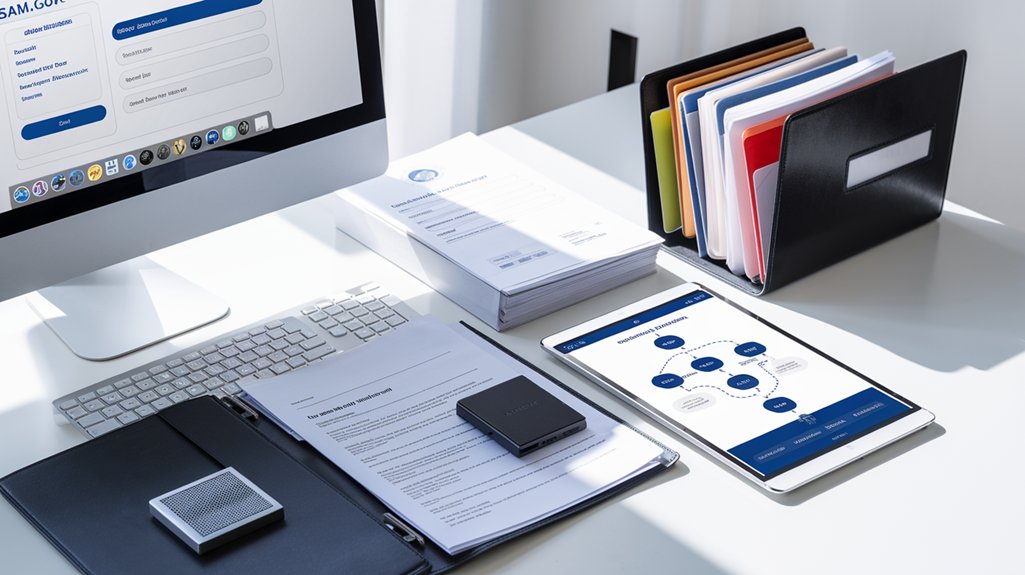Effective SAM profiles require accurate registration information, including a valid UEI and CAGE code. Organizations must maintain current documentation through quarterly reviews and secure filing systems. Implementing data validation procedures prevents delays in contract processing and potential disqualification from federal opportunities. Designating a single contact person for SAM management guarantees accountability and compliance. Proper documentation and regular verification processes form the foundation for maintaining active registration status and securing government contracts.
Essential Registration Information for SAM.gov Compliance

When registering with the System for Award Management (SAM.gov), entities must provide thorough documentation that meets federal requirements for government contracting eligibility. The registration requirements include several critical identifiers: a Unique Entity ID (UEI), which has replaced the previous DUNS number system, and a Commercial and Government Entity (CAGE) code for proper identification. The registration process consists of two distinct parts that must be completed sequentially for successful enrollment.
Compliance verification occurs through multiple channels, including IRS validation to guarantee tax information accuracy. Entities must designate specific points of contact for official communications regarding their registration status and updates. Organizations should be aware that the registration and renewal process can take up to 10 business days to complete. The centralized system design helps streamline interactions between contractors and federal agencies for more efficient procurement processes.
Without these essential components properly documented, organizations cannot maintain active status in the system, which directly impacts eligibility for federal funding opportunities. Incomplete or inaccurate information will delay the registration process and potentially disqualify entities from contract consideration.
Organizational Structure Documentation Best Practices

Documentation forms the foundation of a complete and accurate SAM profile, requiring meticulous attention to organizational details. Entities must maintain current articles of organization, utility bills, and bank statements that consistently reflect the legal business name and physical address.
Effective document organization involves creating a secure filing system where critical validation documents are readily accessible for SAM.gov verification. Validation strategies should include regular audits of organizational documentation to identify inconsistencies before they cause registration delays.
Organizations should implement dual verification processes, guaranteeing both internal and external validation of all submitted materials.
To overcome common challenges like mismatched information or outdated documents, businesses should develop contingency plans and maintain backup copies of all critical documentation. This systematic approach guarantees ongoing compliance and minimizes potential disruptions during the validation process.
A notarized letter requirement applies to certain registration types and must be included with the standard documentation package.
Maintaining Data Accuracy and Security Clearance Requirements

Every successful SAM profile demands unwavering vigilance in data management practices and meticulous attention to security clearance protocols. Organizations must establish quarterly review schedules to systematically verify all profile sections, particularly security clearance information.
Implementing robust data validation procedures guarantees consistency between SAM records and internal documentation. Companies should develop standardized checklists and leverage automated tools to flag discrepancies before they impact federal contracting opportunities. Setting calendar reminders for reviews every 3-6 months ensures businesses maintain compliance with federal regulations. Maintaining accurate banking information is crucial to prevent any disruption in government funding or contract payments.
Security clearance management requires special attention—regularly updating points of contact, monitoring renewal dates, and restricting sensitive information access to authorized personnel only. These clearance protocols prevent unnecessary delays in contract processing.
Fostering a data-focused organizational culture through regular training and clear guidelines empowers staff to maintain accurate records and promptly report potential errors, ultimately safeguarding the company’s federal contracting eligibility. Designating a single contact person for SAM management creates clear accountability and ensures consistent oversight of this critical business function.
Frequently Asked Questions
How Long Does Initial SAM.Gov Registration Approval Typically Take?
The SAM.gov registration process typically takes between 2 and 8 weeks for approval timeline completion.
Simple business structures with accurate documentation may see approval in as few as 2 weeks. However, complex organizations or incomplete submissions can extend the timeline to 8 weeks.
Factors affecting processing time include business structure complexity, information accuracy, system processing volume, and technical issues.
No expedited options exist, and all registrations follow the standard approval timeline.
Can Foreign Entities Register in SAM.Gov?
Yes, foreign entities can register in SAM.gov.
The foreign entity eligibility requirements include obtaining both a DUNS number and an NCAGE code before beginning the SAM registration process.
Foreign organizations must guarantee their business information matches exactly across all databases.
The registration is free, but foreign entities face additional steps compared to domestic organizations.
They must complete the NCAGE application process through the NATO Support and Procurement Agency before proceeding with SAM registration.
What Happens if My SAM Registration Expires During a Contract?
When SAM registration expires during a contract, the government can no longer legally work with the contractor, creating serious contract implications.
Payments may halt immediately, and the contractor becomes ineligible for new opportunities. Contract termination or penalties for non-compliance could follow.
The contractor must prioritize timely registration renewal to prevent these disruptions.
Reactivation involves a complex process that diverts resources from core operations and may damage the contractor’s reputation with federal agencies.
Are Small Businesses Exempt From Any SAM Registration Requirements?
No, small businesses are not exempt from SAM registration requirements.
All businesses, regardless of size, must register in SAM to participate in federal government contracting.
While small business eligibility for certain set-aside programs provides additional registration benefits in SAM, the fundamental registration requirement applies universally.
Through SAM registration, small businesses can self-certify their status and gain visibility to government buyers, which is essential for accessing federal contracting opportunities reserved for small businesses.
How Do I Transfer SAM Registration When Selling My Business?
When transferring ownership of a business, the SAM registration cannot be informally transferred. The process requires:
- Contacting the SAM help desk to initiate a formal transfer request.
- Submitting documentation including:
- Legal names of both entities
- TINs and D-U-N-S numbers
- Proof of business sale
SAM administrators must verify and approve all transfers.
Beginning this process well before contracting deadlines helps prevent disruptions during the business sale shift.